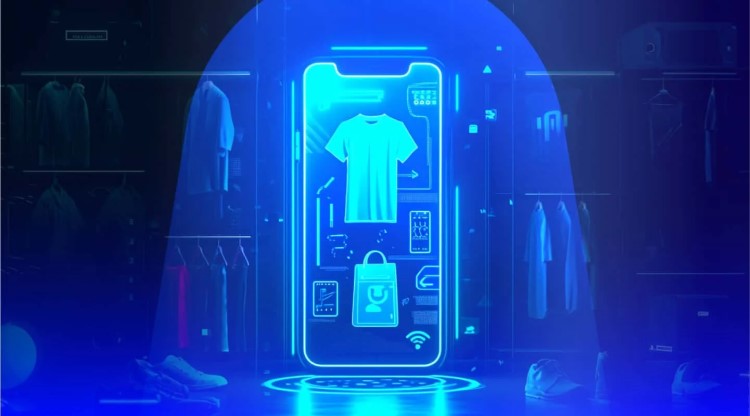
AI-powered retail technology allows businesses to leverage vast amounts of customer data to predict behavior, optimize supply chains, and improve in-store experiences. By adopting AI-driven tools, retailers can offer more personalized experiences, optimize their operations, and increase customer loyalty. This transformation benefits both businesses and consumers, creating a more efficient, convenient, and tailored shopping experience.
Enhancing Personalization with AI-Powered Retail Technology
One of the most impactful applications of AI-powered retail technology is its ability to deliver personalized shopping experiences. Personalization is a key factor in customer satisfaction and loyalty, and AI enables retailers to customize their interactions with consumers at scale. By analyzing customer data, such as browsing history, purchase behavior, and demographic information, AI systems can generate product recommendations and personalized promotions tailored to each shopper’s preferences.
AI-driven algorithms can track real-time data from customer interactions across various touchpoints, including e-commerce websites, mobile apps, and physical stores. This data allows retailers to offer dynamic product recommendations, ensuring that customers see the most relevant items for their needs. For instance, if a shopper frequently browses a specific category, AI can prioritize those products or suggest complementary items. Personalized emails, website experiences, and push notifications further enhance the customer journey, making it more engaging and relevant.
In addition to personalization, AI-powered retail technology also plays a crucial role in improving customer service. Virtual assistants and chatbots powered by AI can handle basic customer inquiries, product searches, and order tracking, providing instant support to shoppers. These systems not only reduce wait times but also allow human agents to focus on more complex issues. As AI-powered chatbots become more advanced, they are better equipped to answer nuanced questions and provide more tailored solutions, further enhancing the customer experience.
AI-Driven Inventory Management and Supply Chain Optimization
AI-powered retail technology has transformed how retailers manage inventories and optimize supply chains. Traditional inventory management relies heavily on historical data and manual processes, often leading to inefficiencies like overstocking or stockouts. AI systems, in contrast, use real-time data and predictive analytics to accurately forecast demand, ensuring products are available where and when needed.
For example, AI analyzes sales patterns, seasonal trends, and external factors like weather or economic shifts to predict the correct inventory levels. This allows businesses to avoid over-ordering unsellable products, reducing waste and lowering costs. On the other hand, AI prevents stockouts by alerting retailers when inventory runs low, ensuring popular items are promptly restocked.
AI also optimizes supply chains by monitoring shipping routes, warehouse capacity, and supplier performance. It identifies bottlenecks and suggests improvements, ensuring products move through the supply chain efficiently. This reduces delays and improves the customer experience. AI’s ability to predict and mitigate disruptions ensures smooth operations during peak seasons or unexpected events.
Visual Search, AR, and AI in Customer Interaction
In recent years, AI-powered retail technology has introduced visual search and augmented reality (AR) tools to improve the shopping experience. Visual search lets shoppers upload images of items they want to buy. AI analyzes the image and finds matching products for sale. This feature simplifies the search process, making it easier for consumers to find products quickly.
Platforms like Pinterest and Google have implemented visual search, allowing users to discover products by uploading images. This AI-powered tool is especially popular in fashion and home decor, where describing items can be difficult. Retailers using visual search improve customer engagement, helping shoppers find items more efficiently.
Another AI-driven innovation is augmented reality (AR), which lets customers virtually interact with products. AR is particularly effective in fashion, beauty, and furniture, where shoppers want to “try on” or “place” items at home before buying. AI-enhanced AR apps allow customers to see how products look on them or in their spaces, leading to more confident purchasing decisions. As AR technology advances, it will become a more significant part of the AI-powered retail landscape.
AI-Powered Technology in Physical Stores
Although e-commerce has benefited greatly from AI, physical stores are also seeing significant improvements thanks to AI-powered retail technology. In-store AI applications can optimize everything from store layouts and shelf organization to customer engagement and security.
For instance, AI can help retailers analyze foot traffic patterns and shopper behavior to determine the most effective store layouts. By understanding how customers navigate the store, retailers can optimize product placement to encourage more browsing and increase sales. AI systems can also analyze customer preferences and buying patterns to offer personalized in-store experiences, such as recommending items or promotions based on a shopper’s purchase history.
In terms of security, AI-powered surveillance systems can monitor customer behavior to detect potential theft or other suspicious activities. These systems use real-time data to alert staff to any issues, helping retailers prevent losses and maintain a safe shopping environment.
Furthermore, AI-powered checkout systems are reducing the need for traditional cashiers. Self-checkout stations with AI capabilities can scan items, process payments, and even offer personalized recommendations based on the items in the customer’s cart. These systems not only speed up the checkout process but also enhance the overall shopping experience.
The Future of AI-Powered Retail Technology
The future of AI-powered retail technology is bright, with continuous advancements expected to further transform the industry. In the coming years, AI will play an even greater role in customer interactions, inventory management, and supply chain optimization. As AI systems become more sophisticated, retailers will be able to offer even more personalized, efficient, and engaging shopping experiences.
AI’s ability to process large data sets and detect patterns beyond human capability enables businesses to make smarter, data-driven decisions. This leads to increased efficiency, lower costs, and improved customer satisfaction. Additionally, AI-powered tools like chatbots, augmented reality (AR), and visual search will evolve, offering more immersive shopping experiences.
As consumer expectations rise, AI-powered technology will help retailers meet growing demands. Companies that invest in AI now will better adapt to market changes, outperform competitors, and provide excellent service.
AI-powered retail technology is transforming shopping by improving efficiency and delivering personalized solutions. From enhancing personalization to optimizing inventory management and introducing visual search and AR tools, AI reshapes how retailers operate and engage with customers. The future of AI in retail promises more immersive and seamless experiences. Retailers must adopt these technologies to remain competitive and satisfy today’s evolving shopper expectations.

